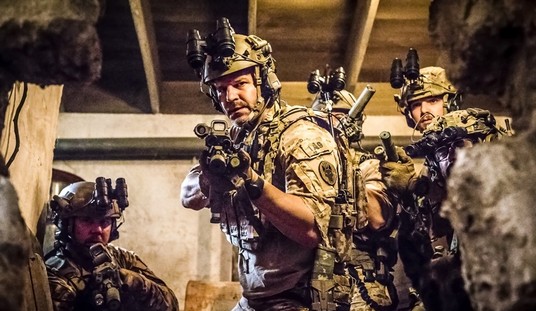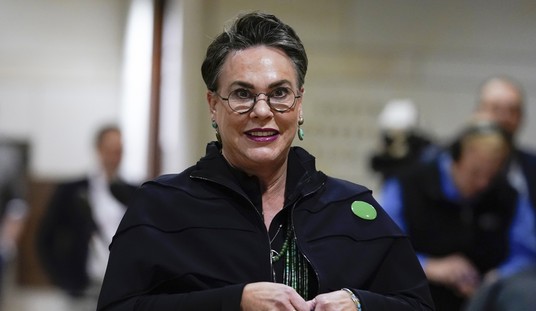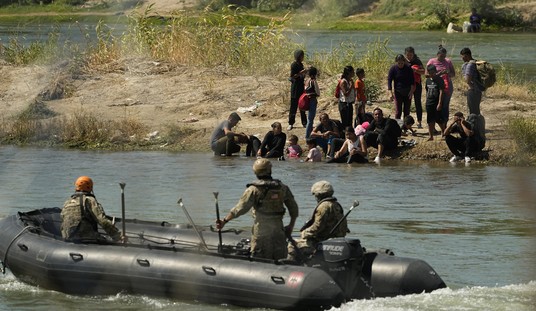A new book is out that goes a long way toward setting the record straight on George W. Bush’s impact on the war on terror. It is by the guy who led the interrogation teams that questioned “high value targets” ensconced at Guantanamo Bay. In it the terrorists themselves tell us what the American left still refuses to believe, that George Bush did keep us safe after 9/11.
A couple of interesting facts come out of it. First, as the 9/11 Commission Report hints, it was Bill Clinton’s — and now Barack Obama’s — policy of treating terrorism as a law enforcement issue rather than a military problem that directly led to 9/11. The mastermind of the attack, and the guy who beheaded Wall Street Journal reporter Daniel Pearl, Khalid Sheikh Mohammed, has this to say:
But perhaps the most riveting part of the book is what KSM told Mitchell about what inspired al-Qaeda to attack the United States — and the U.S. response he expected. Today, some on both the left and the right argue that al-Qaeda wanted to draw us into a quagmire in Afghanistan — and now the Islamic State wants to do the same in Iraq and Syria. KSM said this is dead wrong. Far from trying to draw us in, KSM said that al-Qaeda expected the United States to respond to 9/11 as we had the 1983 bombing of the Marine barracks in Beirut — when, KSM told Mitchell, the United States “turned tail and ran.” He also said he thought we would treat 9/11 as a law enforcement matter, just as we had the bombings of the U.S. embassies in Kenya and Tanzania and the USS Cole in Yemen — arresting some operatives and firing a few missiles into empty tents, but otherwise leaving him free to plan the next attack.
“Then he looked at me and said, ‘How was I supposed to know that cowboy George Bush would announce he wanted us ‘dead or alive’ and then invade Afghanistan to hunt us down?’” Mitchell writes. “KSM explained that if the United States had treated 9/11 like a law enforcement matter, he would have had time to launch a second wave of attacks.” He was not able to do so because al-Qaeda was stunned “by the ferocity and swiftness of George W. Bush’s response.”
But KSM said something else that was prophetic. In the end, he told Mitchell, “We will win because Americans don’t realize . . . we do not need to defeat you militarily; we only need to fight long enough for you to defeat yourself by quitting.”
Consider that for a moment and then tell me whether Obama’s strategy is working or if he’s playing into the hands of the terrorists either out of pig-ignorance or out of a cynical calculation that the bill for his fecklessness will be paid by future presidents.
The second point is that Bush’s strategy of extraordinary rendition and the maintenance of a permanent Club Fed facility at Guantanamo paid huge dividends. Obama has tried to play the tough guy by launching drone attacks against terrorist leaders. That gets you a feel-good and some favorable comments by the New York Times but it is actually self-defeating in the long run. The only way you gain knowledge of enemy capabilities and intentions is by interrogating people.
Once their resistance had been broken, enhanced interrogation techniques stopped and KSM and other detainees became what Mitchell calls a “Terrorist Think Tank,” identifying voices in phone calls, deciphering encrypted messages and providing valuable information that led the CIA to other terrorists. Mitchell devotes an entire chapter to the critical role KSM and other detainees played in finding Osama bin Laden. KSM held classes where he lectured CIA officials on jihadist ideology, terrorist recruiting and attack planning. He was so cooperative, Mitchell writes, KSM “told me I should be on the FBI’s Most Wanted List because I am now a ‘known associate’ of KSM and a ‘graduate’ of his training camp.”
Whoa, whoa. What’s that. Enhanced interrogation works? Theissen, who writes this piece, has touched on the subject before.
Indeed, the first terrorist to be subjected to enhanced techniques, Zubaydah, told his interrogators something stunning. According to the Justice Department memos released by the Obama administration, Zubaydah explained that “brothers who are captured and interrogated are permitted by Allah to provide information when they believe they have reached the limit of their ability to withhold it in the face of psychological and physical hardship.” In other words, the terrorists are called by their religious ideology to resist as far as they can — and once they have done so, they are free to tell everything they know.
Several senior officials told me that, after undergoing waterboarding, Zubaydah actually thanked his interrogators and said, “You must do this for all the brothers.” The enhanced interrogation techniques were a relief for Zubaydah, they said, because they lifted a moral burden from his shoulders — the responsibility to continue resisting.
This is amazingly similar to the same code of conduct for members of the US military taken prisoner.
When questioned, should I become a prisoner of war, I am required to give name, rank, service number and date of birth. I will evade answering further questions to the utmost of my ability. I will make no oral or written statements disloyal to my country and its allies or harmful to their cause.
This willingness of jihadis to assist their captors — and the vital role taking prisoners plays in conducting counterinsurgency — was also commented on by war correspondent Michael Yon in his coverage of the battle for Mosul in 2005. In this an infantry unit has just raided a house and captured a terror cell leader and they question him on the spot:
Moving on hot intelligence, Deuce Four conducted nine simultaneous raids on May 19th. One insurgent in particular was believed to know the locations of others. If the Deuce Four had gone in and just shot the man, he would be dead and useless, but instead LTC Kurilla asked him about the locations of two predominant terrorists. The insurgent answered, “For me to give the locations of these two men would be treason. However, in Iraq we have a saying: if death comes to greet you at your door, introduce him to your brother.” The soldiers loaded the Strykers and headed to that location. A capture-cascade had begun.
There is no doubt that George Bush and his administration had a better grasp of how to fight terrorism than Obama. They focused on tactics that worked and kept the terrorist off balance. Obama, in stark contrast, has invited terror apologists into the inner circle of security planning and has carried out a public relations campaign oriented on appeasing his base while making the nation much more vulnerable to coordinated and alleged “lone wolf” terror attacks.













Join the conversation as a VIP Member